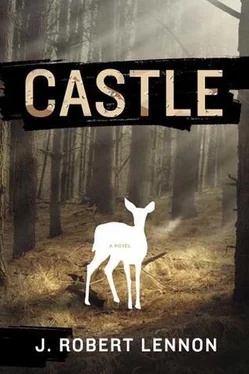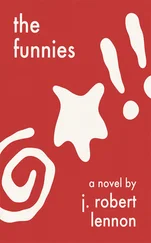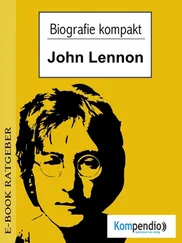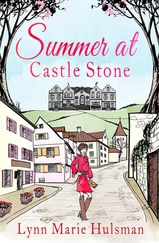I drove to the Gerrysburg Public Library and parked in the lot beside it. I remembered the library well — when I was a boy, it had also housed a museum of local history, which had eventually been eliminated to make room for more books. The parking lot had been expanded at some point in the past, but the asphalt was cracked and patched now, with bits of it scattered around, heaved up by winter.
Inside, the library was much as I had remembered it, except that the card catalog was gone, replaced by a bank of computers. This transition had clearly taken place some time ago, however, because the computers were old, and two of the four bore handwritten placards readingOUT OF ORDER. There were also a pair of newer computers, above which hung a sign markedINTERNET. A dirty-looking man sat at one, playing video chess; at the other a teenage mother typed furiously while her baby slept in a nearby stroller.
I strode up to the circulation desk, where an old woman was using the telephone. She appeared to be calling patrons who had books on hold. I waited patiently for her to finish her conversation, and when she did, she looked up with an inquiring expression. She appeared energetic for her age — which I estimated to be about seventy — and her gaze was bright and clear.
“Good afternoon,” I said. “I’m trying to find out information about a particular local resident, whom I’m told lived here in the 1960s.”
“I’ve lived here all my life,” the old woman said. “Perhaps I know this person.”
“He was a psychologist named Avery Stiles.”
The old woman’s expression didn’t change, but her focus seemed to deepen, as if she had ceased looking at my face, and was now trying to see what lay behind it. “I see,” she said. “I do think I remember such a person. A bit of a radical, maybe? I seem to remember some trouble.”
“I’m told he taught at the college.”
“That may be so. Have you tried an internet search?”
When I said I hadn’t, the librarian suggested I go wait for a computer to free up. Meanwhile, she would do a bit of low-tech sleuthing for me. I thanked her, then walked over to the computer area. A lone wooden chair appeared to have been designated the internet-waiting seat. Beside it stood an easel, and propped up on it, a hand-lettered list of rules. 30 MINUTES PER PERSON, read one. SILENCE MUST BE OBSERVED. NO OBJECTIONABLE INTERNET CONTENT.
I waited several minutes before the teen mother noticed me. She had been typing furiously, working on what appeared to be an e-mail, and peered furtively over her shoulder. Her expression was grim, her complexion wan and blotchy. On her cheek was a brown patch of the sort commonly associated with addiction to certain illegal drugs. I offered up a small smile, which the girl rebuffed, or perhaps didn’t see.
A few minutes later, the girl closed the browser, got up, and grabbed the handles of the stroller. She stalked past me, her lips moving. I took her seat and reopened the browser.
Avery Stiles psychology, I typed into the search box. A list of hits scrolled down the screen. Most of these appeared to be false matches — someone named Avery, someone named Stiles, a mention of psychology somewhere nearby. But a few did indeed seem to be the Avery Stiles I was looking for. These were mostly class lists — archived information about graduates of various schools. Stiles evidently had attended the University of California at Berkeley and the University of Pennsylvania, where he received his doctorate in 1958. Another entry had him as an assistant professor at SUNY Milan the following year. Still another referred to “the sad story of Dr. Avery Stiles.”
I clicked on this one and brought up the entire article. It was part of a recent paper written by a sociologist, a woman named Lydia Bulgakov, also of the local SUNY. The paper seemed to be a study of academia itself as a social system, and the various ways that students and professors could find themselves marginalized within it. The section that mentioned Avery Stiles was near the end, and was something of a summary; “the sad story of Avery Stiles” was alluded to casually, and without explanation, as if the reader was expected know what story Professor Bulgakov was referring to. There was no other such reference in the paper.
I was about to navigate back to my search results when I sensed someone’s gaze, and I turned to find the chess-playing man leaning over, reading the screen of my computer. He was tall and thin, perhaps sixty years old, and wore enormous square-framed eyeglasses with thick lenses. Mostly bald, he nevertheless had let his gray hair grow quite long, and it hung around his head in a fringe. He appeared quite mad.
“Hello,” I said.
He turned to me, squinting. His mouth hung open, and his eyes, magnified by the glasses, looked wounded, affronted, though not by me.
The man was certainly harmless; nevertheless, I found his gaze to be disturbing, and a strange unease spread over my body. I felt weak and slightly sick to my stomach. I asked the man if I could help him with something, and his only response was to turn abruptly back to his chess game.
Clearly there was nothing more to be said or done — this small incident was over. And yet I heard myself say, “I asked you a question.”
The man’s response was immediate. He froze, his hands poised over the keyboard, and began to tremble. I could see his eyes; they were darting spasmodically from side to side, as if he were receiving an electric shock. For some reason this reaction made me angry, and I dug in.
“When you’ve invaded someone’s privacy,” I said, “and then that person asks you a question about what you’re doing, you are obliged to answer that question.” My voice, I’m afraid, was quite strident; I was well aware that I was overreacting, but I felt powerless to stop. “I wanted to know if there was anything I could help you with. Is there?”
The man shook openly now; his aluminum-frame chair rattled beneath him and his head hung down over the keys. He was blinking, and his lips moved wordlessly.
“Answer me,” I said, between clenched teeth.
“Sir?” came a stern voice.
“Answer me.”
“Sir!”
I turned. It was the librarian. She was holding a small cardboard box in her hand, and her lips were pale and pressed tightly shut. She looked older than she had at the counter.
“Leave that man alone,” she said. “He is doing no harm.”
I stared at her.
“I found this for you,” she said. “The information you want might well be here.”
She held out her hand, and I accepted the box. She returned to the desk without waiting for thanks, and when she arrived there she glared up at me over the tops of her glasses.
The box contained a roll of microfilm. I closed the internet browser, stood up, and went to the back of the stacks, where the microfilm viewers were kept when I was young. They were still there, exactly as I remembered them, and both seemed to be in working order.
It took me several minutes to recall how the machines operated, but soon I had the roll of film installed, and pages of text and images were zooming across my field of vision. They belonged to the Milan Times newspaper, the only “local” paper Gerrysburg had ever had. This roll was from 1965, and after a few minutes of idly scanning the pages, I realized just how much there was to read, and how long it was going to take me. I heaved a deep sigh, and winced as the pain in my head flared up — I had a large bump, just above the hairline, from my fall into the pit two days before, not to mention my aching ribs — then I scrolled back to the beginning and began, methodically, to read every single headline.
1965 was a year of relative calm and prosperity in the area. There were, of course, war stories, but for the most part the paper focused on local news: businesses opening, a school renovation, a fire, a blood drive. As I read, I tried to remember what my own life was like then. A small child, I must have played outdoors, watched television, listened to adults talk. But nothing came to me. I could remember, vaguely, what my mother looked like — the chignon she wore in those days, and her tired beauty — but I could recall nothing specific. Indeed, the more I thought about it, the less I seemed able to remember. The earliest memory I could come up with was the one I have already mentioned, working in my father’s shed and wondering about the box that contained his gun. But I was very nearly a teenager then. Surely there was something more.
Читать дальше











